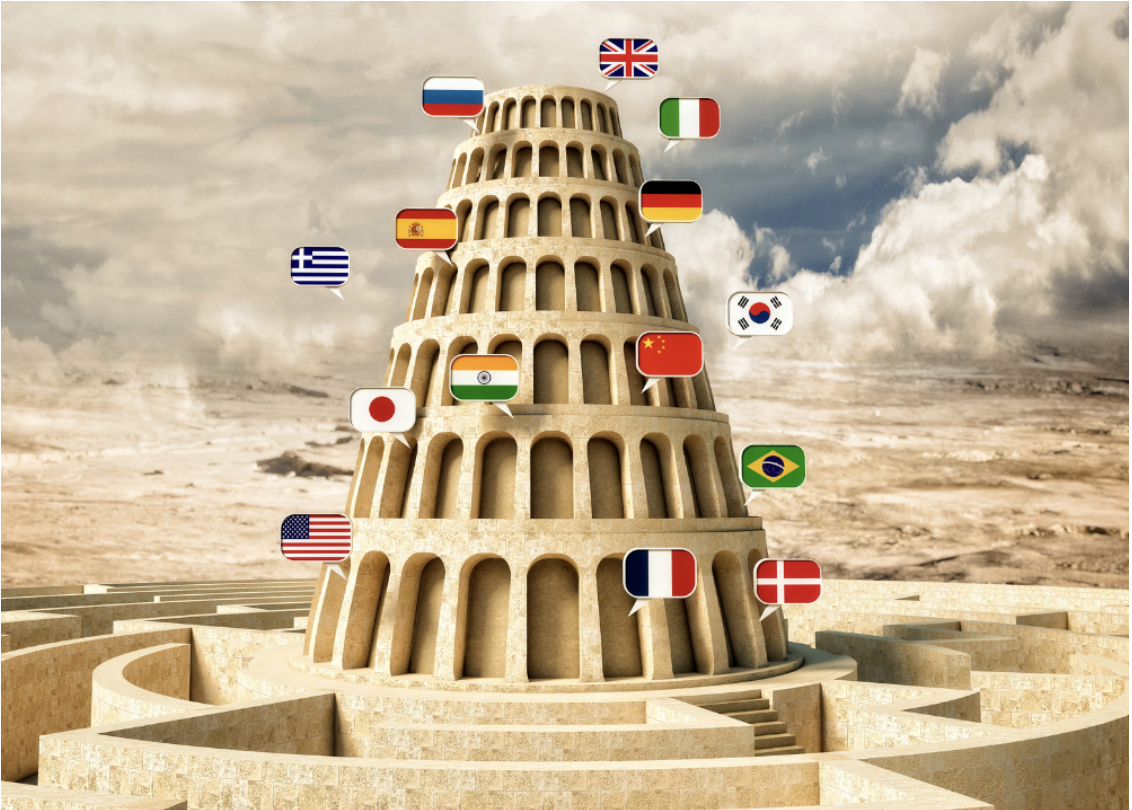Continents and regions contributing words to the English language: Africa, Asia, Australia, Europe, South America, North America, Arabia, South Pacific, Caribbean.
Coca-cola, bubble gum, bikinis, digital media tycoons, hamburgers, frozen mocha, and blue jeans: Do we live in a boringly homogenized New-York-and-California-ish world? Not really. These are not American or even “English” words, but (barring “bubble,” “digital media,” and “blue”) imports from baroque Europe, the Incan empire, the South Pacific, pre-colonial Africa, 19th-century German immigrant communities, Tokugawa Japan and classical Arabia:
What about blue jeans? The Academie Francaise resentfully accepts “blue-jean” as a “mot d’origine anglo-americaine” now permanently implanted in the French language. Mais non! The term “jeans” is French, originally Marseille dockside slang for denim-wearing Italian sailors from Genoa (“genes” in French) and brought to English sometime in the 16th century. “Denim” is French, too, literally meaning fabric “from Nimes.”

The Academie Francaise on “blue jeans.”
Vogue/France has a better take, here.
The sad story of the original Bikini.
Al-Arabiya explains mocha.
Earlier: A quick trawl through some modern English-language vocab and their origins, yields small word-pictures of old civilizations and modern neighbors. Some examples:
Ancient Egyptian: gum, oasis, ibis, basalt, ebony, ivory, pharaoh
Japan then: haiku, samurai, zen, geisha, tycoon
Japan now: manga, anime, karoshi, salaryman, sushi, karaoke
Persia then: chess, apricot, magic, jasmine, julep, caravan, tambourine
Iran now: chador, ayatollah, fatwa
Aztecs: chili, chocolate, coyote, mescal, tomato, guacamole
Vikings: berserk, fjord, iceberg, reindeer, saga, ski, Viking, walrus
Malay: bamboo, gong, paddy, java, orangutan, amok, gecko, bantam
BBC’s “Vocabularist” notes that “pyramid” was originally a Greek word, meaning a kind of layer-pastry, like baklava. The actual Egyptians apparently called a pyramid a “mer.”
And two language/linguistics sources
How many words are there, actually? Some blathering and hand-waving from the Oxford English Dictionary editors, who term this good question “a distraction”:
“The question ‘How many words are there in the English language?’ cannot be answered by recourse to a dictionary.”
What?! They’re supposed to know! It’s their job! OED editors try to climb out of self-dug hole.
OED’s most recent update, for March 2022, has “nearly 700” newly classified words: first gentleman, burner phone, gender-critical, trigger warning, ydraw (died out in the 1400s), decarbonize, etc. A look at the March updates.
And how many languages? The Summer Institute of Linguistics, originally an evangelical group dedicated to Bible translations, lists 7,151 known languages around the world, from A-Pucikwar (sadly vanished, Andaman Islands, no known relationship to others, said to use only the numbers “one,” “two,” plus some variants of “more”) to Zuni (9,500 speakers, New Mexico) by country and language family.
Ed Gresser is Vice President and Director for Trade and Global Markets at PPI.
Ed returns to PPI after working for the think tank from 2001-2011. He most recently served as the Assistant U.S. Trade Representative for Trade Policy and Economics at the Office of the United States Trade Representative (USTR). In this position, he led USTR’s economic research unit from 2015-2021, and chaired the 21-agency Trade Policy Staff Committee.
Ed began his career on Capitol Hill before serving USTR as Policy Advisor to USTR Charlene Barshefsky from 1998 to 2001. He then led PPI’s Trade and Global Markets Project from 2001 to 2011. After PPI, he co-founded and directed the independent think tank ProgressiveEconomy until rejoining USTR in 2015. In 2013, the Washington International Trade Association presented him with its Lighthouse Award, awarded annually to an individual or group for significant contributions to trade policy.
Ed is the author of Freedom from Want: American Liberalism and the Global Economy (2007). He has published in a variety of journals and newspapers, and his research has been cited by leading academics and international organizations including the WTO, World Bank, and International Monetary Fund. He is a graduate of Stanford University and holds a Master’s Degree in International Affairs from Columbia Universities and a certificate from the Averell Harriman Institute for Advanced Study of the Soviet Union.
Read the full email and sign up for the Trade Fact of the Week